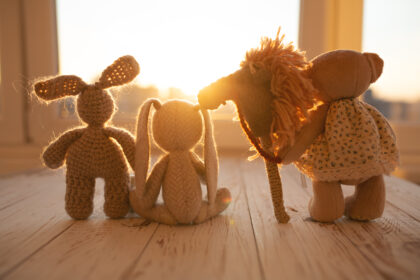People often talk about memory problems, sometimes playfully. Usually, the problem is some version of forgetting. As we ritualized crossing thresholds this Sunday, I was thinking of another kind of memory problem.
We human beings often remember the past too well. We have a persistent memory of the way things once were, and we might miss some changes that have taken place. We miss that we have crossed some thresholds—as individuals and as communities—because our memory of a previous version of things is crystal clear in our minds.
This happens to me all the time in a post-COVID world. Some things about the world are just not what my memory insists they are. Some things about me are not what my memory holds onto.
When I was a child, there was a cartoon character that captured my attention for a hot second. The show was on at the right time of day on a channel we watched frequently, and it entertained my young mind. Then, I moved on. I became entertained by other things. My connection to that particular cartoon faded and was replaced by other connections.
As a birthday present one year in my twenties, my mother gave me a collection of toys related to this cartoon character. I was baffled. My affection for this cartoon seemed like a passing interest at best, and it had been years since I’d even thought about this particular show.
Maybe my mother was just being nostalgic. Maybe she was holding an outdated memory about my connection with this fictional character. We talked about how my interests had gone in different directions, and I didn’t get any more gifts related to that cartoon. But it was important to name that evolution. To say out loud: I’m not the same person now that I was then.
We are crossing all sorts of personal thresholds on a regular basis, engaging in our own evolutions and journeys, leaving behind some things and embracing others. Our communities are constantly crossing thresholds as well, in constant states of becoming.
Persistence of memory sometimes keeps us from celebrating the way things have evolved and changed. If we miss how The Way Things Once Were is different from The Way Things Are Now, we might misconstrue how our communities can meaningfully respond to challenges and grow in new directions.
Of course, we often feel some grief about the ways things have changed. Our memories of previous ways of being might evoke a deep sense of comfort and safety and affection, and crossing a threshold into a different reality can feel threatening and uncertain.
Maybe this same sense of uncertainty and confusion touched my mom when I confessed that I no longer felt any real connection to a certain childhood hero. In that moment, though, her sense of curiosity prevailed. She was able to ask, So what do you like now?
In a way, she was asking me how she needed to revise her memory so that her idea of me could become more accurate. Which is another way of saying, she was asking how to love who I am rather than only loving who I used to be. I suppose we have the capacity to hold love for both.
As we cross our many thresholds and envision hopeful futures for ourselves and for our communities, may our curiosity invite that same love within us—to love who we are and who we are becoming at least as much as we love who we used to be.
Share this post:
